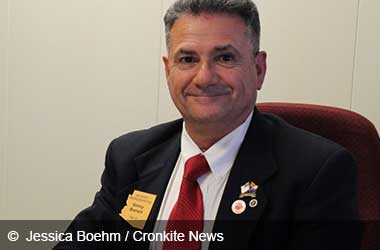 Arizona State Senator Sonny Borelli (R-District 5) almost saw his goal of legalizing sports betting this term go down the drain.
Arizona State Senator Sonny Borelli (R-District 5) almost saw his goal of legalizing sports betting this term go down the drain.
However, the retired Marine had other plans and may have kept Arizona in the running for legal sports betting in 2019.
Borelli’s sports betting bill is unique in that it brings tribal gaming into commercial establishments.
The bill originally titled SB1158, stalled in the Commerce Committee twice after tribal interests requested more time to work out the language in the bill with Borelli.
They think it should be negotiated in the (state’s gaming) compact, which is furthest from the truth, It has to be done legislatively. They’re trying to hijack this issue to strengthen their own position, which weakens the position of the smaller tribes. I have a lot of small tribes in my district and I’m not going to be bullied by anybody.
azfamily powered by 3TV & CBS5AZ
Time Continues to Tick
As time went on, Borelli thought it would be best to get the bill released from the Commerce Committee and moved to Appropriations. After that failed, he decided to strike the original bill and move its language into another bill that he already had sitting in the Appropriations Committee, SB1163. The bill will receive a hearing on Tuesday, making it the first sports betting hearing in the state.
Rule No. 2 for Marines, don’t go to war with a warrior, There’s always a backup plan.
Regardless of the title of the bill, Borelli’s bill would create a unique partnership between tribes and commercial operations in which tribal-owned betting kiosks would be allowed to be placed at bars, private clubs, horse tracks and sports stadiums.
Many states have been dealing with the issue of tribes wanting to have exclusive rights to sports betting, but commercial businesses disagree. Borelli’s bill will allow tribes that exclusivity but still allows for commercial businesses a chance at some piece of the pie.
I want to take advantage of the existing technology with the kiosk, I want to pick up that kiosk, take it out of the casino and put it in a liquor-licensed bar, a beer-and-wine bar or private clubs, like the Elks or VFW.
 Borelli believes that the result of adding sports betting kiosks into bars and clubs allows for more accessibility to consumers who may not be interested in travelling to the casinos. He believes that people may not want to travel a long distance to place small bets, say in the range of $10, but perhaps would stop by a local bar or club to do so.
Borelli believes that the result of adding sports betting kiosks into bars and clubs allows for more accessibility to consumers who may not be interested in travelling to the casinos. He believes that people may not want to travel a long distance to place small bets, say in the range of $10, but perhaps would stop by a local bar or club to do so.
The bill would allow for commercial businesses to either negotiate space-rental prices for the kiosks, or a cut of the revenue that the kiosks generate.
There are currently 24 casinos in Arizona that are run by 16 tribes. The majority of the 7 million people live near the Phoenix area, while the rest of the state is mainly rural. That means most of the state’s population face a somewhat lengthy drive to the nearest casino, another reason Borelli believes that adding kiosks to local bars can help generate more revenue.
Sony Borelli’s bill doesn’t have a mobile component to his bill, saying, “that’s a bridge too far right now”. Although his goal is to make sports betting as accessible as possible throughout the state.
What the Bill Does
The bill includes a “new revenue stream” which imposes a 6.75 percent tax on revenue on all bets made at the kiosks not located on tribal lands. The current tribal compact taxes gaming revenue on a sliding scale from 1-8 percent, which depends on the amount of revenue.
The Tribal-State Compacts contain “detailed regulatory, technical, and internal control standards for the operation of Indian gaming”, according to the Arizona Department of Gaming. The current compact was passed by Arizona voters in the November 2002 election as Proposition 202.
Arizona does have support for legal sports betting from Governor Doug Ducey.
After last year’s Supreme Court ruling to overturn the PASPA ruling, Doucey said,
This is positive news. We have been working on a modernized gaming compact. This ruling gives Arizona options that could benefit our citizens and our general fund
Stephen Hart, an attorney who represents Native American communities and the Arizona Indian Gaming Association, said he expects that bettors will see sports books legalized at tribal casinos first.
My suspicion is that there will be a relatively orderly and civil discourse about what should happen, I think it’s most likely that tribes will initially offer sports wagering. After that, it certainly is possible that other entities could receive legal authorization to do it.

 United States
United States United Kingdom
United Kingdom












